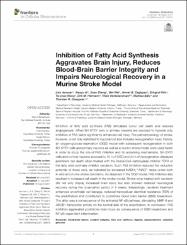| dc.contributor.author | Janssen, Lisa | |
| dc.contributor.author | Ai, Xiaoyu | |
| dc.contributor.author | Zheng, Xuan | |
| dc.contributor.author | Wei, Wei | |
| dc.contributor.author | Çağlayan, Ahmet Burak | |
| dc.contributor.author | Kılıç, Ertuğrul | |
| dc.contributor.author | Wang, Ya-chao | |
| dc.contributor.author | Hermann, Dirk M. | |
| dc.contributor.author | Venkataramani, Vivek | |
| dc.contributor.author | Baehr, Mathias | |
| dc.contributor.author | Doeppner, Thorsten R. | |
| dc.date.accessioned | 2021-09-16T08:34:50Z | |
| dc.date.available | 2021-09-16T08:34:50Z | |
| dc.date.issued | 2021 | en_US |
| dc.identifier.citation | Janssen, L., Ai, X., Zheng, X., Wei, W., Çağlayan, A. B., Kılıç, E. ... Doeppner, T. R. (2021). Inhibition of fatty acid synthesis aggravates brain injury, reduces blood-brain barrier integrity and impairs neurological recovery in a murine stroke model. Frontiers in Cellular Neuroscience, 15. https://dx.doi.org/10.3389/fncel.2021.733973 | en_US |
| dc.identifier.issn | 1662-5102 | |
| dc.identifier.uri | https://dx.doi.org/10.3389/fncel.2021.733973 | |
| dc.identifier.uri | https://hdl.handle.net/20.500.12511/8191 | |
| dc.description.abstract | Inhibition of fatty acid synthesis (FAS) stimulates tumor cell death and reduces angiogenesis. When SH-SY5Y cells or primary neurons are exposed to hypoxia only, inhibition of FAS yields significantly enhanced cell injury. The pathophysiology of stroke, however, is not only restricted to hypoxia but also includes reoxygenation injury. Hence, an oxygen-glucose-deprivation (OGD) model with subsequent reoxygenation in both SH-SY5Y cells and primary neurons as well as a murine stroke model were used herein in order to study the role of FAS inhibition and its underlying mechanisms. SH-SY5Y cells and cortical neurons exposed to 10 h of OGD and 24 h of reoxygenation displayed prominent cell death when treated with the Acetyl-CoA carboxylase inhibitor TOFA or the fatty acid synthase inhibitor cerulenin. Such FAS inhibition reduced the reduction potential of these cells, as indicated by increased NADH(2)(+)/NAD(+) ratios under both in vitro and in vivo stroke conditions. As observed in the OGD model, FAS inhibition also resulted in increased cell death in the stroke model. Stroke mice treated with cerulenin did not only display increased brain injury but also showed reduced neurological recovery during the observation period of 4 weeks. Interestingly, cerulenin treatment enhanced endothelial cell leakage, reduced transcellular electrical resistance (TER) of the endothelium and contributed to poststroke blood-brain barrier (BBB) breakdown. The latter was a consequence of the activated NF-kappa B pathway, stimulating MMP-9 and ABCB1 transporter activity on the luminal side of the endothelium. In conclusion, FAS inhibition aggravated poststroke brain injury as consequence of BBB breakdown and NF-kappa B-dependent inflammation. | en_US |
| dc.language.iso | eng | en_US |
| dc.publisher | Frontiers Media SA | en_US |
| dc.rights | info:eu-repo/semantics/openAccess | en_US |
| dc.rights | Attribution 4.0 International | * |
| dc.rights.uri | https://creativecommons.org/licenses/by/4.0/ | * |
| dc.subject | Blood-Brain Barrier | en_US |
| dc.subject | Cerebral Ischemia | en_US |
| dc.subject | Fatty Acid Synthesis | en_US |
| dc.subject | Hypoxia | en_US |
| dc.subject | Neuroprotection | en_US |
| dc.subject | Reduction Potential | en_US |
| dc.title | Inhibition of fatty acid synthesis aggravates brain injury, reduces blood-brain barrier integrity and impairs neurological recovery in a murine stroke model | en_US |
| dc.type | article | en_US |
| dc.relation.ispartof | Frontiers in Cellular Neuroscience | en_US |
| dc.department | İstanbul Medipol Üniversitesi, Rektörlük, Rejeneratif ve Restoratif Tıp Araştırmaları Merkezi (REMER) | en_US |
| dc.authorid | 0000-0002-6242-3709 | en_US |
| dc.authorid | 0000-0001-6494-8923 | en_US |
| dc.identifier.volume | 15 | en_US |
| dc.relation.publicationcategory | Makale - Uluslararası Hakemli Dergi - Kurum Öğretim Elemanı | en_US |
| dc.identifier.doi | 10.3389/fncel.2021.733973 | en_US |
| dc.identifier.wosquality | Q1 | en_US |
| dc.identifier.scopusquality | Q1 | en_US |



















